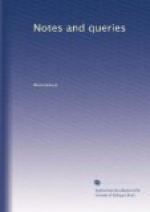This reads invitingly; the writer then proceeds:—
“From such sources I have obtained may of the ballads in the present collection. Those to which I have stood godfather, and so baptized and remodelled, I have mostly met with in the ‘broad-side’ ballads, as they are called.”
Although the writer here speaks of Ritson and Percy as if he were acquainted with their works, it is very evident that he had not looked into their contents. The name of Evans’ Collection had probably never reached him. Alas! we look in vain for the tantalising “pamphlet of songs,”—still, perhaps, snugly resting on the “pot-head,” where our author in his “poetical dream” first saw it. The “black-lettered volume of ballads” too, in the library of the “ancient descendant of a Border family,” still remains in its dusty repository, untouched by the hand of Frederick Sheldon.
In support of the object of this paper I shall now point out “a few” of the errors of The Minstrelsy of the English Border.
P. 201. The Fair Flower of Northumberland:—
“It was a knight in Scotland born,
Follow my love, come over
the Strand;
Was taken prisoner, and left forlorn
Even by the good Erle Northumberland.”
This is a corrupt version of Thomas Deloney’s celebrated ballad of “The Ungrateful Knight,” printed in the History of Jack of Newbery, 1596, and in Ritson’s Ancient Songs, 1790. A Scottish version may be found in Kinloch’s Ballads, under the title of the “The Provost’s Daughter.” Mr. Sheldon knows nothing of this, but says,—
“This ballad has been
known about the English Border for many years,
and I can remember a version
of it being sung by my grandmother!”
He also informs us that he has added the last verse but one, in order to make the “ends of justice” more complete!
P. 232. The Laird of Roslin’s Daughter:—
“The Laird of Roslin’s daughter
Walk’d through the wood
her lane;
And by her came Captain Wedderburn,
A servant to the Queen.”
This is a wretched version (about half the original length) of a well-known ballad, entitled “Captain Wedderburn’s Courtship.” It first appeared in print in The New British Songster, a collection published at Falkirk, in 1785. It was afterwards inserted in Jamieson’s Popular Ballads and Songs, 1806; Kinloch’s Ancient Ballads, 1826; Chambers’ Scottish Ballads, 1829, &c. But hear what Mr. Sheldon has to say, in 1847:—




